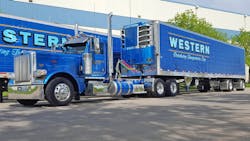COMPANY: Western Distributing Transportation Corp., Denver, CO
OPERATION: Family-owned and operated trucking business dating back to 1933, when founder Guido Mapelli trucked beer from Golden, CO, and sold it in Denver just after Prohibition was repealed. Western Distributing offers dry van and refrigerated long- and short-haul trucking services across the contiguous 48 states in addition to other subsidiary businesses.
PROBLEM: Digitizing business documents in trucking can often be easier said than done.
Western Distributing wanted to digitize delivery paperwork to speed up operations. The trouble is, making that change from paper may require truck drivers to use their phones' built-in cameras to take photos of documents like bills of lading or other signed delivery documents.
There's quite a range of quality when it comes to the many different phones out there, especially with Android-based devices, and many drivers may be using older phones that don't work as well for this purpose. Western Distributing tried getting digital document images and was less than thrilled with the results, which were often too poor in quality to be legible.
The company's goals were to reduce time between load delivery and customer invoicing, ensure reliability of digital document scanning, and integrate document scanning with its existing transportation management system. But document images Western Distributing was seeing were often too dark or blurry to read, so customers couldn't be invoiced until these problems were resolved.
SOLUTION: Implement LoadDocs document-capture solution.
Western Distributing found it could get much more consistent, high-quality digital documents with the LoadDocs app by Vector. Nearly 150 of the trucking company's drivers have been using LoadDocs since May 2017, including some with older cell phones who had struggled to get good results prior to using this app.
Brian Belcher, chief operating officer and co-founder of Vector, said the company makes it a point to ensure its app will work optimally with each device on which it's used. "If you look at the stats of smartphone ownership across the trucking industry, the majority is Android, and quite a few are older generations of products," he told Fleet Owner.
"Every time there's a download of our app, we go and buy the device," he noted, so Vector closely monitors each smartphone that'll use LoadDocs. "If you come into our office right now, there's a little over 80 different Android smartphones there, and they're mostly all older devices," he said.
Vector then runs a series of tests and diagnostics and develops a device-specific code. "Throughout our code base, we have comments for each device; we know when you launch the app if you're on an LG phone from, say, 2016," Belcher said. "We know the model it is, we know how it autofocuses, we know the camera lens' focal length." The app also works with iPhones, which he noted is a simpler matter since there are fewer models and operating system versions to adjust to.
Thus LoadDocs is optimized to work with whatever devices are running the program—whether that means focusing from 6 in. away or 9 in. away, for example—and each smartphone is worked into the equation. "We adjust based on each device," Belcher emphasized.
A priority in Western Distributing's LoadDocs rollout was ease of use. Drivers using LoadDocs type in trip information, take cell phone photos of relevant documents, and send them to the back office through the app. "It's easy to use and it's easy to learn," said driver Stella Rodriguez.
Most of the company's delivery documents are now digital, either photographed by drivers on the road or scanned by back-office associates, which saves time and money. IT manager Jeff Stevens said he expects savings will continue to grow as more of its drivers use the app.
* * *
About the Author
Aaron Marsh
Aaron Marsh is a former senior editor of FleetOwner, who wrote for the publication from 2015 to 2019.
